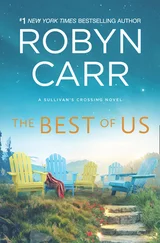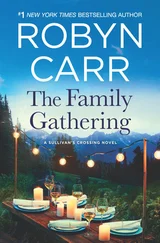He shook his head and gave a shrug. “Not since the Sadie Hawkins dance in eighth grade.”
“But people fixed you up all the time,” she reminded him.
“That’s when you go to the same birthday party or wedding reception. That’s not a date. And if I liked the woman, I asked.”
She frowned in doubt. “Are you wearing contacts?”
He shook his head again, but he was still grinning like a fool. “A gift from my mother. So, do you like seafood?”
“I’m from Boston,” she informed him.
“I’ll find something. I’ll pick you up at six. Is seven too late for dinner? Because I have to—”
“Shouldn’t I pick you up? Find the restaurant?” she asked.
“Nah, you did the hard part, the asking. I’ll do the rest. And by the way, I’m glad you asked. Thanks.”
“Were you ever going to?”
“I think so, yes. I was being cautious. Not for my sake. For yours.”
“Hmm. You’ll tell me more about that at dinner.”
“Fair enough. And you can tell me about the exciting world of research.”
She shook her head. “I really want you awake on this, our first date.”
* * *
Laine was very good at not overthinking things; she rarely found herself dwelling. On the Friday of her date, she dismissed it from her mind and focused on other things—a computer search for the right new rug for in front of the fireplace in her bedroom. She read a few chapters from a book she’d been into, put in a call to Pax and did a load of laundry. She was highly trained and knew how to place focus exactly where she wanted it. She had proven herself disciplined long ago—it was especially important in deep cover.
She could manage not to think about the fact that she hadn’t been on a date in a year and a half. How the devil had it been that long?
She also added a layer of blue polish to her toenails. It was funny the things one missed during a deep-cover assignment. The first two she’d been on had been relatively short—two weeks in a clinic that was suspected of drug trafficking and then four weeks working in a trucker’s dispatch office trying to ferret out the human trafficking connection. But it was over six months in The Fellowship and what she’d really come to grieve was toenail polish, perfume and bath gel. Not to mention hair products. Just because Laine was an FBI agent and an expert markswoman didn’t mean she was a thug or a tomboy. No, sir. She was actually a girlie girl. Yes, she could throw a big guy over the hood of a car and cuff him. And yes, she’d been in some fights—not by choice, but hell, sometimes duty called. She was strong, tough, fearless and feminine.
Finally it was nearly time and she showered, blew out her hair and donned a pair of nice wool slacks, boots, sweater, jacket and long silk scarf. The boots had thin, high heels—Eric was a solid six-two. She could use a little lift.
Her first surprise when she answered the door was how well he cleaned up. She nearly laughed at herself. Had she expected him to arrive in his mechanic’s uniform and sensible lace-up boots? He wore dark jeans, a nice sweater, suede jacket and black cowboy boots. And his name wasn’t sewn anywhere on his outfit.
“Ready?” he asked.
“Ready,” she said, turning to lock the door and flinging her white fringed scarf over her shoulder. He stood aside to let her proceed and she suddenly stopped because there in the driveway was the shiniest, cranberry-red, restored car. “Wow.”
“I guess you can appreciate an old car.”
“Nineteen-seventy Chevy El Camino. Car or truck? That’s the question.”
“You know your cars,” he said, coming around her to open the passenger door. “You into cars?”
“Not in a big way, but this is beautiful.” But she did know her cars. She could identify just about any vehicle make and model on sight. That was part of police work. She could also remember license plates without the need to write down the numbers—not exactly a common thing among law enforcement officers, but she had a skilled memory. Beyond skilled, really.
A beautiful restored classic was all about aesthetics and Laine had a sudden and respectful appreciation for what Eric could do. When he joined her in the front seat she was caressing the dash. “Did you do this?”
“I did,” he said, turning the key and bringing the engine to life. “A friend saw her at a farm, a nonworking farm, along with four other old, wrecked cars. The property owner was ancient and didn’t give a hoot about those junkers, so I went there and made him a quick deal, handed him some cash and hauled them back to Oregon to work on. This one, I got attached to. I upgraded it, obviously—it’s not all original.”
“So you buy and restore old cars?”
“Sometimes. I have a steady clientele that comes to me for body work and I’m always on the lookout for deals, steals and old abandoned classics, not to mention original parts. Just body work...”
“This isn’t just body work,” she said, running a hand along the smooth dash. “This is art.”
That made him smile. “That’s my business.”
“I thought your business was mechanics, maintenance. And gas.”
“That’s part of it. We mean to take care of the town if we can. But body work and restoration is my first love. We’re finishing up a new paint bay in the shop. I left a lot of our specialty tools behind and this is a little like starting from scratch, but building a business makes sense. And it’s already working.”
“Wait a minute—left behind?”
“Oh,” he said with a laugh. “Okay, here’s how it went. I bought a failing business a little over ten years ago in Eugene. Over the past decade, with the help of some great mechanics and body men, we made it good and developed a loyal clientele and then some moneybags comes along and wants it bad enough to keep upping his offer until I started looking around for another place to work. Norm’s station had been for sale for years. It’s not much of a garage, really, but it sits on a real nice piece of land with plenty of room to expand. Norm never paid much attention to the space he had—all he wanted to do was pump gas, fix small stuff like brakes. He let a lot of junk collect on his lot rather than putting the space to use. I bought it, cleared it, poured a big slab and we’re expanding, literally one wall at a time. Plumbing and wiring takes more time than anything and in three months, we have a body shop and full-service garage up and running, not to mention new pumps. I’m hoping a couple more former employees from Eugene decide to join me here. We work well together. And I like the ocean.” He glanced at her, eyes twinkling. “Nice little town.”
“Nice little town,” she echoed.
“You’re the mystery,” he said.
“Me? Nah. I’m just someone who finagled an off-site telecommuting job because I had shoulder surgery. We can call it rehab plus leave of absence plus vacation, but it really boils down to—I can’t travel or manage temporary duty assignments, so I get to work from home when I can. And home can be anywhere, right?”
“Yet you drove three thousand miles to get ‘home’?”
“I can trust you to keep your mouth shut about that, right?”
He shrugged. “Who am I gonna tell?”
“Good,” she said.
“No, Laine. I mean, who am I gonna tell?” Then he peered at her with those haunting green eyes.
“The IRS? Because those sons of bitches are mean as snakes.”
He laughed. “Who’s your boss?”
“President Obama. And there could be a supervisor or two between me and Mr. President.” Then she gave him her teasing smile.
He laughed. “Why Thunder Point?”
She sighed. “The short answer is, I have a friend here. Devon is a friend of mine and once she moved here she just couldn’t shut up about this little town. I went online—my specialty, remember—and got a Realtor to send me a bunch of pictures. The longer answer—I put together a plan to take an extended leave from the government job, time to rehab, to think about whether I want to continue to live in the D.C. area, to work that much, that hard. To think about whether my heart’s still in it... It’s complicated. The pressure is terrible sometimes. I’m good at what I do, but seriously, what’s too much? I mean, do you have pressure?”
Читать дальше












